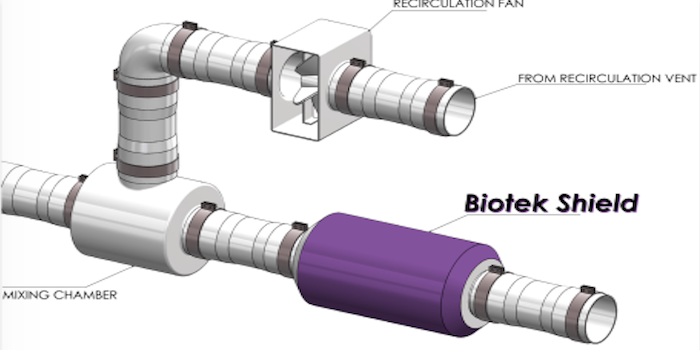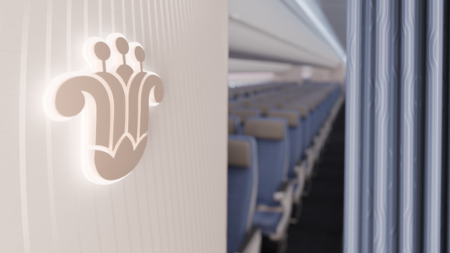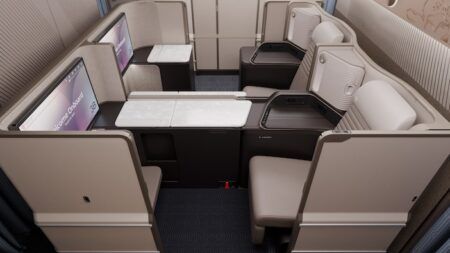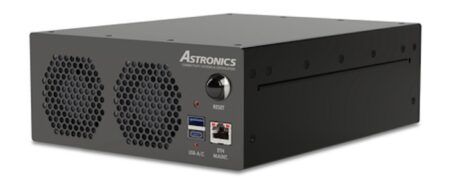PWI, a US-based company known for cabin lighting systems, has developed a virus-neutralising system for use in deactivating airborne contaminants aboard commercial aircraft. The device, named Biotek Shield, is designed to be installed in the air conditioning system of the aircraft and uses UVC (ultraviolet) light technology to neutralise pathogens such as bacteria and viruses- including H1N1, SARS, West Nile, Tuberculosis and coronaviruses.
“In order to get the world back to some sort of normalcy, the public needs to be safe travelling. We can now help stop the airborne spread of pathogens inside aircraft.” stated Robi Lorik, president and CEO of PWI. “Since viruses are not alive, nothing will ‘kill’ a virus. But a virus can be rendered incapable of reproducing or infecting a host.”
According to PWI, UVC light has been proven to neutralise coronaviruses and stop them from infecting others. The company has thus contracted with a certified lab to test the effectiveness of Biotek Shield on neutralising easily communicable contaminants.
“There are only a handful of BSL 3 or ‘Biological Safety – Level 3’ labs which are authorised to test on live viruses like Covid-19,” explained Lorik. “These viruses can be very dangerous, so locating a lab certified to test with Covid-19 was a challenge in itself.”
Once testing is complete, PWI is confident that the lab will certify that the UVC light used in Biotek Shield will neutralise 99.9999% of virus cells, rendering the virus unable to replicate itself or infect humans.
The Environmental Protection Agency (EPA) uses a logarithmic scale to measure the effectiveness of UVC light in neutralising pathogens such as coronaviruses. The lowest on the scale is a Log-1, which kills 90% of live bacteria, but will not kill viruses as small as a coronavirus. The highest level is Log-6, which kills 99.9999% of pathogens, including Covid-19. The UVC used in Biotek Shield will use the most lethal – Log-6 level – in negating viruses.
“Only a Log-6 system will neutralise the pathogens, and that’s what we’re developing in our device. There are other systems available, but they do not have the efficacy that ours will,” claimed Lorik. “Other systems use topical wands or foggers that are far less effective and are one-time-only use, without continual sanitisation. Not only is our system the strongest at Log-6 level, but it also continuously cleans the cabin air, whether the plane is on the ground or in the air.”
PWI is seeking STC/PMA approval by the FAA for Biotek Shield. The device is initially being designed to fit within the air conditioning system of the Boeing 737, and will then be adapted to fit other commercial aircraft. The device, which is installed in the air conditioning duct work, operates silently and invisibly throughout the flight. When the aircraft is on the ground, the device will draw power from the aircraft’s auxiliary power unit (APU), and when the aircraft is in the air the device will be powered by the aircraft engines. According to PWI, Biotek Shield creates no waste and only requires maintenance every three to five years.
“PWI has been designing and producing LED lighting for aircraft since 2012. It is an obvious step to take LED light from simply illuminating the cabin to cleaning the air. We have the knowledge and the experience with the FAA,” stated Lorik. “We’re now ready to take it to the next level to address this worldwide problem with our lighting solution.”
The Biotek Shield UVC Treatment System will be developed by Aero Biotek Inc, a sister company to PWI Inc. The Biotek Shield is the first in a planned line of products that addresses the problem of airborne pathogens inside aircraft cabins.





